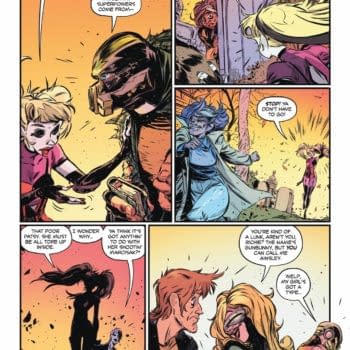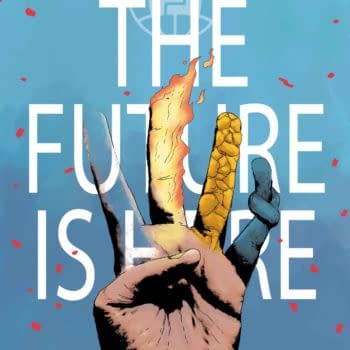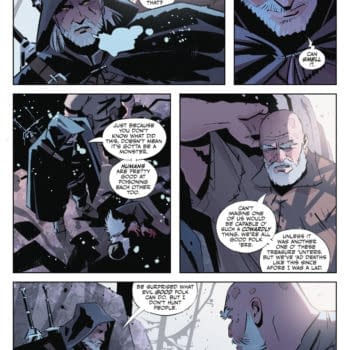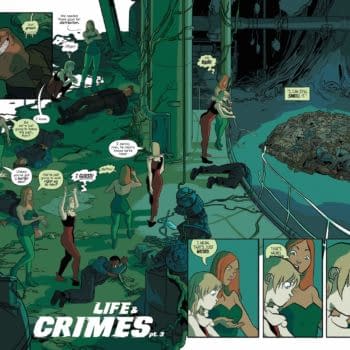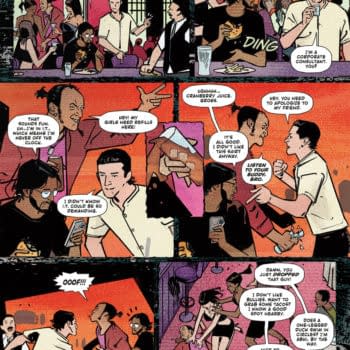Posted in: Comics, Recent Updates | Tagged: becky cloonan, Comics, Dan Jackson, dark horse comics, entertainment, gerard way, my chemical romance, shaun simon, The True Lives Of The Fabulous Killjoys
On Staying Human In A Killjoys World – Gerard Way In The Bleeding Cool Interview
The True Lives of the Fabulous Killjoys, from its Free Comic Book Day teaser in 2013 throughout its 6 issue run, certainly made some noise. The uncanny world that Gerard Way, Shaun Simon, Becky Cloonan, and Dan Jackson created took us into the troubled lives of several sets of characters battling the shadow of Better Living Industries through desert outer wastelands and "the Lobby" slums of Battery City.

Even deciding what questions to ask The Umbrella Academy writer and former My Chemical Romance lead singer Gerard Way about this epic was a tough one: do you go for the process questions or the big picture? Mainly, I made a bee-line for the big picture to try to figure out just why Killjoys left me with so many questions about identity and the nature of personal liberation. Way talks about the craft of comics, the role of masks, and the ways in which we find our very personal messiahs in this interview with Bleeding Cool.
Hannah Means-Shannon: To start with something technical about the comic, how do you think that using radio broadcasts or even music lyrics in comics influences the way a reader reads the comic and experiences it? Adding those audio elements for them?
Gerard Way: Well, it's interesting. In terms of something you've never heard before, in terms of a news report or something like that, that's always played pretty well in my head. Songs are a little trickier. If I think back to the times I had first ever "heard" a radio or news report or something, I remember reading Dark Knight Returns when I was a kid, and that had a lot of that. And I loved it. It always immediately spoke in my head. And over the years, I've found that songs are a little trickier, just writing out a song. I think we have the added benefit in this book that at least some of those audio clips that are playing, some of the people who do read the book had actually heard them before. They are actually quoted from things they've listened to. But, yeah, music is a little trickier. There's not really music in this story. There's a moment where the band playing on stage talks to the crowd.
But I think music can be an obstacle, because you're hearing maybe the cadence of it, but you're not hearing the tones. But it can be done. It's funny, whenever I look at comics that have music in them, I'm always trying to picture it in my head as a song. And sometimes there are too many syllables. There's something that throws it off in your head. So it's a tricky thing. But I think people need to keep doing it and keep trying to get that in there–that sound.
HMS: Yeah, the first time I encountered that was with Watchmen and I found it really haunting, but it's still not the same as hearing the song and it's more like a kind of mood suggestion.
GW: I totally agree with that. And in The Watchmen, the use of songs really felt like I was reading poetry at that point. It didn't feel like music. And I think in that way, it was extremely effective.
HMS: Ok, what about the settings in Killjoys? What influenced you to have the stark desert setting in contrast to the city setting, and almost the kind of Monument Valley setting. What do you think that does for the comic?
GW: I think in the basic story sense, it allows us to tell the multiple stories we're telling. You get the Lobby, and then you get the BLI, and then you get the desert. To me, even when first forming the project and shooting the videos, it was always just about the contrast it would create. And a lot of the stories that you're getting in there are contrasting with each other. So, I felt that in that way they were effective.
HMS: I think you chose the right artist for the job because it's pretty amazing what Becky Cloonan can do with settings to make it seem so dark and crowded versus bright and open between the two.
GW: Yeah, she's amazing and really stuck it out. The coolest thing about Becky is that Shaun [Simon] and I knew right away that she was the right artist for the book. She just sent us sketches in her spare time and there was no contract, it didn't even have an imprint yet. We didn't know who was publishing it. So it was very much hers in the beginning, too. She's been nothing but amazing.
HMS: There's a lot about masks and assuming identities in the comic, both good and bad. How do you think that enables us as people, like using personas, to become maybe more than we think we can be? Or to help transform us?
GW: That's a cool way to put it. I think they are vital. In a lot of ways, I think that we're all just making it up. I think it's really important, for exactly the reason you just said, to create a persona to get you to the place maybe you didn't realize you could go. It gives you that extra thing you need to get there. Maybe you can accomplish more than you thought you could. When you have a mask. When you go to your favorite convention and cosplay. There's probably stuff happening there in your brain. I wouldn't be surprised if some of those people who cosplay feel more like themselves when they are cosplaying. So there's something really powerful to use there.
I guess the trick, and what this book deals with a lot, in my own personal experience with it, is, at what point do you make a disconnect from that persona? At what point do you actually start growing internally as a human being and maybe the persona prevents you from doing that? You have to really tackle that. Because that's my personal experience with this project.
HMS: So, you think that at some point, while it's useful, it might become a limiting thing?
GW: Absolutely. It's very useful. I learned it from loving David Bowie as a kid. And even he spent years trying to get away from the Ziggy Stardust persona. But they are truly useful. You just have to use it with caution because it's a powerful thing. And then when other people believe…
HMS: Yeah, I can see how there are some elements of the dangerousness in Killjoys as well. When the masks are being used to invade people and take them over.
GW: Yeah, there's definitely a reason that it's in there, to show the dangers of masks. And Shaun was really firm about what he wanted that ending to feel like and have a lot to do with masks and getting rid of them, and I'm so glad he was. That was a big point for him that he wanted to drive home and work together on that, and I'm glad that he did. Because it ended up hitting home for me.
HMS: For me, and I'm a big fan of the series, a lot of the comic, the underlying energy, was about love and about people needing each other, but not necessarily handling that so well. Is that part of the message of the comic for you? That that's part of the basis of resisting uniformity or control? Relationships?
GW: Yeah, I think that's another freaking awesome observation. Your connection to other people keeps you human, and that connection, staying human–that's what you have against control. That's your biggest weapon against control is the connection you have to people. It's like if somebody is being controlled by their job, the connection is to their family. And if they stay connected to those people, the job will never really have control over them. It's very easy to watch people get sucked into that and then they lose connection to their family. So that's why it's important to have those relationships.
HMS: And that's a very modern problem, maybe more than ever?
GW: Oddly enough, or maybe it's not that surprising, a lot of it is connected to the way we engage with social media, too. Because now it really is about all of us, it's about the individual. It's become less about connectedness even though we feel extremely connected through all this technology, there's also this disconnect that happens. Because you're not actually talking to anyone. You're not actually meeting them for coffee. To me, social media is about "you". It's like, "Well, twenty people like this thing I said", so that's about me. I'm talking with this other person, but that's really about me.
HMS: It kind of relates to our discussion about personas as well, because people spread their persona out through social media and that definitely can be a limiting thing, an artificial thing for them.
GW: Yeah, absolutely. There's the danger of this in social media. You kind of become your persona, or what you're known for, and the way you handle yourself on there, the information you're putting out. You're also expected to constantly behave that way. I've seen a lot of accounts that rely on their shock value. And those people have to stay that way. The minute they change, it kind of falls apart for them. And they'll lose followers, if that matters to them.
HMS: It's definitely kind of a dangerous experiment to create yourself as an online persona. How to be public and yourself at the same time. It's weird.
GW: And tricky. Because you want to be yourself, but especially in the online world, you almost need a shield there. Or you just have to turn it off completely, which is something I've been experimenting with. Tuning out any kind of white noise, tuning it out completely. Completely being yourself to the point where you can't go seeking approval for that. You can't look to that persona-level junk. You have to be excited that you're being yourself.
HMS: Another big question: there's a lot of strange religion and spirituality in the comic, at least it seemed that way to me. Do you think spirituality can help us build a better future? Or is just something that works well for the comic?
GW: No, I do. Here's how I've always felt about belief and religion: I feel that anything that helps you get through this, anything that helps you become a better person, it's good for you. If the belief in a Star-destroyer sized planet-magnet is what gets you through the day, and helps you treat people good, and equally, then, by all means, worship the planet-magnet. Do whatever it is you need to do to help get you through this life. I've always felt that way. I think spirituality, even if it's BS, even if none of it exists, even if there's no God, even if there's nothing–I consider myself relatively spiritual. I believe in a God. I don't know what it's like, but I do believe in it. It's the only thing that makes any sense. Maybe I'm just looking for order in the chaos. I would like to say for the record too, though, that I do believe in Evolution and I do believe in science (laughs).
HMS: Perhaps related to the religion question, I suppose: how do you think we choose our saviors and messiah-figures in society? And why do we need heroes?
GW: How do we choose them? Hmm. I think some people are looking for something that maybe they don't possess. I think that's one way, but I think that there are many ways in which people look for heroes, messiahs, things like that. I think to me, ultimately, you are looking for someone who understands you, or at least you think understands you. It all comes down to understanding for who we look to as heroes.
HMS: So, it's pretty personal? You are looking for someone you think would understand you, or who you think you could get along with?
GW: I think so, yeah. I think anybody you really look up to like that, we connect with them. Even a pop star who's making music that is maybe considered by others to be the lowest form of art, somebody had to sit there and listen to that person on the radio, and they are probably saying, "I bet I could hang out with that person". There's that connection there, like, "I bet I could hang out with that person. I bet they're really funny". Or, "I bet they have a great sense of humor. I bet they also hate sports". So they make this connection of who they think the person is.
The collected edition of The True Lives of the Fabulous Killjoys was released on May 7th by Dark Horse Comics
Hannah Means-Shannon is EIC at Bleeding Cool and @hannahmenzies on Twitter
















